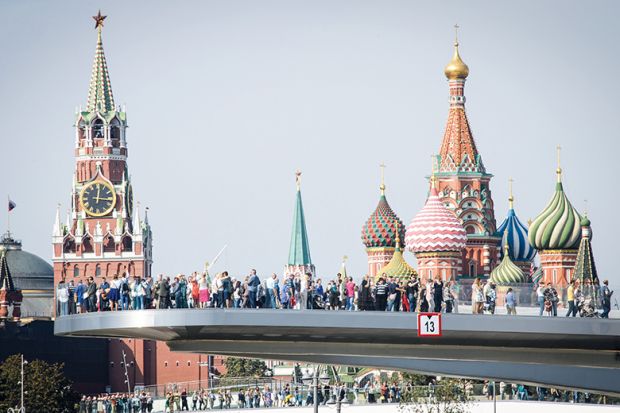Russian international student recruitment has moved the country closer to its political allies, with a top-down push drawing more learners from countries that share the Kremlin’s worldview.
Despite the war in Ukraine and accompanying dip in Western students, Russia has managed to increase its share of international students, becoming the sixth largest student destination globally, after the US, the UK, Canada, France and Australia, according to government figures.
Greg Yudin, a professor at the Moscow School of Social and Economic Sciences, was wary of putting too much stock in the Kremlin’s numbers. Still, he said, one thing was clear: there has been a shift in Russia’s recruitment strategy since the conflict in Ukraine.
“Previously, the idea was to market the Russian universities to make them attractive to foreign students. Now they’ve changed to Soviet-style tactics to build government partnerships.”
Currently, the largest group of overseas students in Russia comes from Kazakhstan, followed by China, then other central Asian countries, Egypt and India. In 2023, Russia’s Ministry of Education increased its government-backed scholarships for foreign students to 30,000 spots, up from 23,000 the year before.
The country has prioritised students from Africa and China, another similarity with Soviet times, Professor Yudin noted. But beyond recruitment, the analogy starts to break down. In contrast to the Soviet Union, which had relatively progressive, well-regarded science-focused education, today’s Russia boasts fewer world-leading institutions, with many continuing to ride on their former prestige, he said.
“In the socialist bloc, education was very good. And maybe by African standards, compared to what you have in some countries, it is still decent,” Professor Yudin said.
Although Russian university offerings in the humanities may not draw international students, the country’s degrees in engineering, agriculture and medicine – particularly in-demand skills in the Global South – remain relatively strong and comparatively inexpensive, said Dmitry Dubrovsky, a research fellow at the department of social science at Charles University in Prague.
He believed that Russian universities would continue to see gains in student flows from “friendly” nations, including China, Iran, Brazil and India.
“The number could increase if the Russian government provided good price deductions and other possible privileges for the foreign students to demonstrate the ‘normalcy’ of Russian HE and the situation in general,” he said.
While the war in Ukraine may have put off the vast majority of Westerners from studying in Russia and pushed many scholars to leave the country, Dr Dubrovsky thought it may have actually strengthened ties with other nations, where some students take the Kremlin line.
“Some of them – and I’ve met such people even before the war, teaching at HSE [the Moscow-based Higher School of Economics] – believe that Russia is a vanguard of the world’s resistance against American imperialism, and therefore, they rather sympathise with Russia.”
Maria Popova, associate professor in the department of political science at McGill University, also expected an increase of students from countries where Russian disinformation on the war on Ukraine is rife – for example, Iran, Indonesia and South Africa – although she predicted flows from Kazakhstan might drop, in line with Astana’s recent ambivalence towards Moscow.
But she cautioned that, where Russia is concerned, nothing – not even a free ride to attend university – is for free.
“Russia, like the Soviet Union, uses international students as both a source of income and a target for indoctrination into an ideological worldview that Russia favours,” she said.
“In the Soviet period, the ideology was Marxism-Leninism, now it’s anti-Westernism, anti-democracy, anti-LGBTQ rights, [and] emphasis that Russia is a superpower.”
Register to continue
Why register?
- Registration is free and only takes a moment
- Once registered, you can read 3 articles a month
- Sign up for our newsletter
Subscribe
Or subscribe for unlimited access to:
- Unlimited access to news, views, insights & reviews
- Digital editions
- Digital access to THE’s university and college rankings analysis
Already registered or a current subscriber? Login








